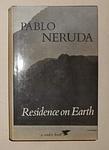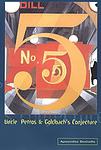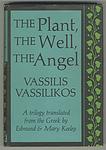The Greatest Greek, Chilean "Fiction" Books Since 1900
Click to learn how this list is calculated.
This list represents a comprehensive and trusted collection of the greatest books. Developed through a specialized algorithm, it brings together 300 'best of' book lists to form a definitive guide to the world's most acclaimed books. For those interested in how these books are chosen, additional details can be found on the rankings page.
Genres
Countries
Date Range
Reading Statistics
Click the button below to see how many of these books you've read!
Download
If you're interested in downloading this list as a CSV file for use in a spreadsheet application, you can easily do so by clicking the button below. Please note that to ensure a manageable file size and faster download, the CSV will include details for only the first 500 books.
Download-
1. The House of the Spirits by Isabel Allende
"The House of the Spirits" is a multi-generational saga that explores the lives of the Trueba family, set against the backdrop of political upheaval in an unnamed Latin American country. The narrative is driven by the family's strong and magical women, including clairvoyant Clara and her granddaughter Alba. The story spans over three generations, weaving together personal, social, and political threads, and is rich in elements of magical realism. The novel explores themes of love, violence, social class, and the struggle for power.
-
2. Zorba the Greek by Nikos Kazantzakis
In this novel, a young intellectual who is immersed in books and ideas embarks on a journey with a passionate and adventurous older man named Zorba. The two men have contrasting personalities, which leads to a series of philosophical discussions and adventures. The story is set in Crete and explores themes of life, death, friendship, love, and the struggle between the physical and intellectual aspects of existence. Zorba's zest for life and his fearlessness in the face of death inspire the young man to embrace a more physical and spontaneous way of living.
-
3. The Savage Detectives by Roberto Bolaño
"The Savage Detectives" is a novel that follows the lives of two Latin American poets, Arturo Belano and Ulises Lima, who are founders of a literary movement called "visceral realism." The book is divided into three parts and is narrated by multiple characters, providing different perspectives on the protagonists. The narrative spans over 20 years, following the poets' journey from Mexico City to Europe, Israel, and Africa, as they search for a mysterious poetess and navigate through the world of literature, sex, drugs, and the complexities of life.
-
4. 2666 by Roberto Bolaño
The novel is a sprawling, ambitious work that spans continents and time periods, centering around an elusive, reclusive German author. It intertwines five different narratives: a group of European academics searching for the author, a professor in Mexico dealing with his own personal crises, a New York reporter sent to cover a boxing match in Mexico, an African-American journalist in Detroit, and the horrifying and unsolved murders of hundreds of women in a Mexican border town. The narratives are linked by themes of violence, mystery, and the search for meaning in a chaotic world.
-
5. The Last Temptation of Christ by Nikos Kazantzakis
This novel presents an alternative interpretation of the life of Jesus Christ, who is depicted as a conflicted, all-too-human figure who struggles with his divine destiny. The book explores his journey through life, his friendships, his fears, and his ultimate temptation to avoid crucifixion and live a normal life. The narrative delves into the psychological and emotional aspects of his experiences, creating a complex, humanized portrayal of a traditionally divine figure.
-
6. Z by Vassilis Vassilikos
"Z" is a political novel that explores the events surrounding the assassination of a prominent leftist politician in Greece. The story delves into the corruption and violence that pervades the government, with the narrative alternating between the perspectives of the victim, the assassins, the investigators, and the government officials involved. The novel is a critique of political tyranny and an exploration of the struggle for justice in a corrupt system.
-
7. Residence on Earth by Pablo Neruda
"Residence on Earth" is a collection of poems that delve into the human condition, exploring themes of love, despair, loneliness, and the search for identity and meaning. The poems are characterized by their deep introspection, vivid imagery, and profound emotional resonance. The author's unique style combines surrealism, historical allusions, and a keen observation of the natural world, resulting in a powerful and evocative exploration of the human experience.
-
8. Of Love and Shadows by Isabel Allende
Set against the backdrop of a South American country under a military dictatorship, this novel follows the story of a woman journalist and her lover, a photographer, who, while working together, uncover a hidden mass grave in a remote part of their country. Their discovery leads them into danger as they try to expose the truth about the brutal regime ruling their country, while also dealing with their own personal issues and their growing love for each other. The story is a blend of romance and political drama, showing the power of love and courage in the face of oppression and fear.
-
9. The Third Wedding by Kōstas Tachtsēs
"The Third Wedding" is a powerful exploration of love, passion, and societal expectations set in mid-20th century Greece. The story revolves around a strong-willed and independent woman who has been married twice and is about to enter her third marriage. The narrative delves into her past love affairs, her struggle with the societal norms of the time, and her quest for personal freedom. The book is a poignant commentary on the condition of women in a patriarchal society and the sacrifices they make in the name of love and duty.
-
10. New Islands And Other Stories by María Luisa Bombal
"New Islands and Other Stories" is a collection of evocative short stories that delve into the lives of women, exploring themes of love, isolation, and the search for identity against the backdrop of the lush South American landscape. The narratives often blend reality with fantasy, creating a dreamlike atmosphere that reflects the inner turmoil and desires of the protagonists. Through her lyrical prose, the author examines the complex emotional landscapes of her characters, revealing the ways in which they navigate the constraints of their societal roles and personal relationships. The stories are a testament to the struggles and resilience of women, and a portrayal of the transformative power of the imagination.
-
11. La Brecha by Mercedes Valdivieso
"La Brecha" is a groundbreaking Chilean novel that delves into the life of a middle-class woman who, after years of conforming to traditional gender roles and a subservient position within her marriage, begins to question the societal norms that have long dictated her existence. As she becomes increasingly aware of the oppressive structures surrounding her, she embarks on a journey of self-discovery and liberation. The novel explores themes of feminism, identity, and personal freedom, challenging the status quo of the time and advocating for the empowerment of women to break free from the constraints imposed by a patriarchal society.
-
12. The Daughter by Pavlos Matesis
"The Daughter" is a powerful novel set in Greece during the Second World War. The narrative follows the life of a young girl who is forced to grow up quickly due to the harsh realities of war. Her father, a communist, is executed by the Germans, and the girl is left to navigate the complexities of life, politics, and love in a world that is rapidly changing. The book offers a poignant exploration of the human capacity for resilience, survival, and hope in the face of unimaginable adversity.
-
13. Astradeni by Eugenia Fakinou
"Astradeni" is a coming-of-age novel set in post-World War II Greece. The story follows the life of a young girl named Astradeni, who is forced to grow up quickly due to the harsh realities of war and poverty. Despite the hardships she faces, Astradeni maintains a hopeful and imaginative spirit, often escaping into a world of myths and legends. The novel explores themes of resilience, the power of storytelling, and the enduring strength of the human spirit.
-
14. Uncle Petros and Goldbach's Conjecture by Apostolos Doxiadis
The novel follows the story of a young man who becomes fascinated by his reclusive and eccentric Uncle Petros. As he delves into his uncle's past, he uncovers Petros' obsession with proving Goldbach's Conjecture, a famous unsolved problem in number theory. This obsession led to Petros' alienation from society and ultimately his downfall. The book explores themes of mathematical obsession, family relationships, and the fine line between genius and madness.
-
15. The Plant, The Well, The Angel by Vassilis Vassilikos
This novel weaves a complex narrative that explores the interconnectedness of human life, nature, and the divine. Through the symbolic elements of a plant, a well, and an angel, the story delves into themes of growth, discovery, and spiritual awakening. Set against a backdrop that blends the mundane with the mystical, the narrative follows the journey of its characters as they navigate personal and collective challenges, ultimately seeking redemption and enlightenment. The author masterfully uses these symbols to reflect on the essence of existence, the cycles of life, and the pursuit of meaning in a world filled with both beauty and hardship.
-
16. The Great Chimera by M. Karagatsis
This novel is a captivating tale set in the early 20th century, revolving around the life of Maroussa, a young woman from the Greek island of Hydra. After marrying an older French naval officer, she moves to France, only to find herself trapped in a loveless marriage. Her longing for passion and fulfillment leads her into the arms of another man, setting off a tumultuous series of events. The narrative explores themes of love, betrayal, and the search for identity against the backdrop of cultural and societal expectations. Rich in historical and geographical detail, the story delves into the complexities of human emotions and the eternal quest for happiness and meaning.
-
17. The Story Of Andreas Kordopatis by Thanassis Valtinos
This novel unfolds the life journey of Andreas Kordopatis, tracing his odyssey from his origins in the Peloponnese, through his ventures in the United States and his return to Greece. Set against the backdrop of the late 19th and early 20th centuries, the narrative weaves through the personal and historical, exploring themes of migration, identity, and the pursuit of a better life. Through a blend of personal accounts, letters, and third-person narration, the reader is immersed in the struggles and aspirations of a man navigating the complexities of diaspora and the relentless quest for home and belonging amidst the turbulent tides of history.
-
18. Η Σαρκοφαγος by Giorgos Ioannou
This book delves into the complexities of human nature, society, and the existential dilemmas faced by individuals in post-war Greece. Through a series of interconnected stories, the narrative explores themes of loss, despair, and the search for meaning in a world marked by political turmoil and social change. The author masterfully portrays the struggles of ordinary people trying to find their place in a rapidly evolving society, using vivid imagery and deep psychological insight to bring his characters to life. The work is a poignant reflection on the human condition, offering a critical look at the challenges of adapting to a new reality while clinging to the remnants of the past.
-
19. Colonel Liapkin by M. Karagatsis
The novel revolves around the life and experiences of Colonel Liapkin, a Russian émigré living in Athens during the interwar period. Struggling with the loss of his homeland and status, Liapkin navigates the complexities of his new life in Greece, dealing with issues of identity, exile, and the search for meaning in a world that has drastically changed. Through his interactions with a diverse cast of characters, the narrative delves into themes of nostalgia, cultural displacement, and the quest for personal redemption, painting a vivid picture of the émigré experience in the early 20th century.
-
20. Η κρύπτη by Ε.Χ. Γονατάς
The book unfolds within the mysterious and eerie confines of a crypt, where secrets from the past and present intertwine. As the protagonist delves deeper into the crypt's enigmatic depths, they encounter a series of cryptic clues and supernatural occurrences that challenge their understanding of reality. The narrative masterfully blends elements of horror, mystery, and historical fiction, leading readers on a suspenseful journey through time and darkness. The crypt, with its ancient allure and hidden dangers, becomes a character in its own right, revealing truths that are as unsettling as they are enlightening, ultimately confronting the protagonist with a revelation that could alter their perception of life and death.
-
21. Η Τιμη Και Το Χρημα by Konstantinos Theotokis
This novel delves into the moral and social decay of Corfiot society through the story of a family torn apart by greed and the pursuit of wealth. The narrative focuses on the protagonist's struggle to uphold his integrity and moral values in the face of societal pressure to prioritize financial gain over personal honor. Set against the backdrop of late 19th-century Corfu, the book offers a critical examination of the impact of materialism on human relationships and the corrosive effect of money on traditional values and ethics. Through its vivid portrayal of the protagonist's internal and external conflicts, the novel presents a timeless exploration of the human condition and the choices individuals must make between material wealth and moral virtue.
-
22. Difficult Nights by Melpo Axioti
This book is a poignant exploration of human emotions and experiences, delving into the depths of despair, love, and the quest for meaning in a tumultuous world. Through a series of interconnected stories, the narrative weaves together the lives of various characters, each struggling with their own inner turmoil and societal constraints. Set against the backdrop of early 20th-century Europe, the book captures the essence of the human condition, portraying the complex interplay between personal desires and the harsh realities of life. With its rich, lyrical prose, the novel invites readers to reflect on the nature of difficulty, the nights of the soul we all must navigate, and the glimmers of hope that sustain us through our darkest hours.
-
23. Ο Εξώστης by Nikos Kakhtitsis
This novel delves into the life of a young man grappling with his sexual identity amidst the conservative and oppressive societal norms of mid-20th century Greece. Through a series of introspective monologues and vivid encounters, the protagonist navigates the complexities of desire, shame, and the longing for acceptance. Set against the backdrop of post-war Greece, the narrative explores themes of alienation, the struggle for self-realization, and the quest for freedom in a rigidly structured society. The protagonist's journey is a poignant reflection on the human condition, offering a deep exploration of the internal and external conflicts arising from societal expectations and personal identity.
-
24. The Schoolmistress With The Golden Eyes by Stratis Myrivilis
This novel is set on the Greek island of Lesbos during the Balkan Wars and explores the life of a beautiful and enigmatic schoolmistress who captivates the hearts and minds of the island's inhabitants. Through her interactions with the villagers, soldiers, and especially a young man who becomes deeply infatuated with her, the story delves into themes of love, war, and the complexities of human nature. The narrative is rich with descriptions of Greek island life, blending the personal dramas of its characters with the broader historical context of the era, ultimately painting a vivid portrait of a community at a crossroads of change and tradition.
-
25. The Murderess by Alexandros Papadiamantis
The novel is a gripping tale set in 19th-century Greece, focusing on the life of an elderly woman who becomes a serial killer. Driven by a twisted sense of mercy and the heavy burdens of poverty and societal expectations, she murders young girls to spare them from the hardships of life. The narrative delves deep into themes of morality, gender roles, and the desperation caused by societal and economic pressures. As the protagonist grapples with her actions and their consequences, the story explores the complexities of her psyche and the rural Greek society of the time, offering a profound commentary on the human condition.
Reading Statistics
Click the button below to see how many of these books you've read!
Download
If you're interested in downloading this list as a CSV file for use in a spreadsheet application, you can easily do so by clicking the button below. Please note that to ensure a manageable file size and faster download, the CSV will include details for only the first 500 books.
Download













